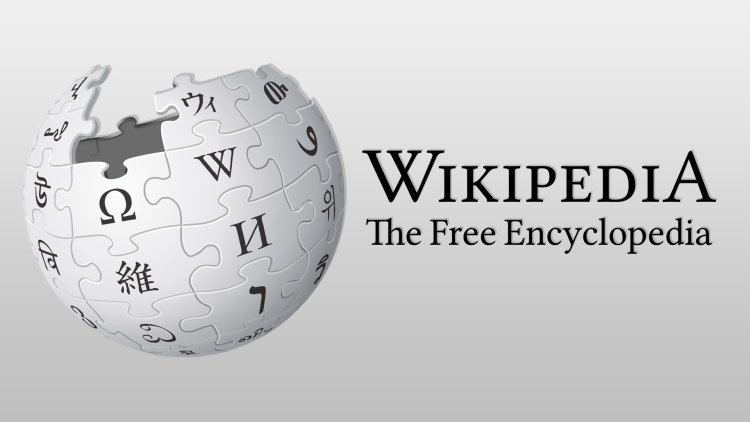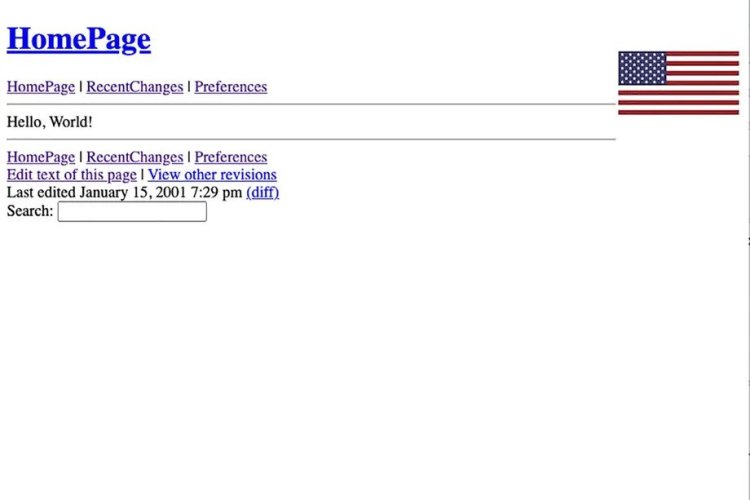Jimmy Wales sells his first edition of Wikipedia as an NFT.
Wikipedia co-founder Jimmy Wales sells Non-Fungible Tokens (NFTs) based on the first edition of the free encyclopedia. Christie's will be holding a token sale from December 3 to December 15, where they will be auctioned off alongside the Strawberry iMac Wales used to launch Wikipedia. The funds will be used for charities and WT.Social, a donation-based social network launched in 2019 by Wales.

Wikipedia co-founder Jimmy Wales sells Non-Fungible Tokens (NFTs) based on the first edition of the free encyclopedia. Christie's will be holding a token sale from December 3 to December 15, where they will be auctioned off alongside the Strawberry iMac Wales used to launch Wikipedia. The funds will be used for charities and WT.Social, a donation-based social network launched in 2019 by Wales.
The Welsh NFT is actually at the heart of an earlier version of Wikipedia that debuted in January 2001. “What you see is displayed on the screen. This is what Wikipedia looked like the moment I installed the software,” he told Verge. A single page is publicly published on the web and can be viewed and edited by anyone, just like Wikipedia itself. However, all changes are reverted back to their original state within 5 minutes. One of the compilations labeled "Hello, World!" It follows a long tradition of programming.
An NFT written on the Ethereum blockchain encodes a smart contract that allows buyers to control this website. Buyers can undo their changes by changing the window, and if they really want to, they can turn off editing or close the page. They can also take a fully automated approach and let Wales manage the pages. The project is conceptually similar to the initial sale by Sir Tim Berners Lee, who tokenized the source code of the first web browser and donated the proceeds of the sale to charities. Wales says it was inspired by the idea of publicly registered and verifiable ownership, although it was easy to sell control of a website without the use of blockchain technology. “What's particularly interesting is that we have the first publicly distributed immutable database, which is new and different from other databases,” he says. It's probably not a bad thing that NFTs are very popular items that can be auctioned off for huge sums. BernersLee source code tokens earned him $5.4 million.

Wales' WT.social platform is an experiment in paid social networks, but not system-style like Friends With Benefits, which restricts access to expensive cryptocurrency tokens. Similar to Wikipedia's sponsorship model (a strategy for eliminating bad incentives that ad-supported services can create on the Internet), you can sign up for free by encouraging members to pay a subscription fee.
Wales is ambivalent about blockchain technology in general. The Wikimedia Foundation accepts Bitcoin donations, but says the money it accrued was "not large." And he believes that many applications of this technique proposed on Wikipedia are flawed. For example, when people allow editors to pay for “better” edits using cryptocurrency. “Yeah, it seems like a good way to get Exxon to control the content of the page for Exxon,” Wales says. Similarly, persistent blockchain storage can make Wikipedia very difficult to censor, but it would also be a nightmare to eliminate abuse, defamation, or privacy-damaging edits.
However, Wales sees the potential of NFTs outside of traditional money-making methods for artists, especially in the field of internet culture. He points to examples of meme images sold as NFTs. Although this image does not affect availability, it does help subjects benefit from online fame that IP law has not yet done. “People usually share [memes] without knowing or infringing their intellectual property rights. Someone uploaded a great picture and it went viral,” he says. “It is very difficult to provide everything.”
“We are very far from the implementation of cryptocurrencies” Wales is also similar to the dot-com booms and recessions of the late 1990s and early 2000s. Some companies failed because they were part of a blowing bubble, while others started with business models that were not yet technologically feasible. . Wales said: “We are still far from mass adoption of cryptocurrencies because of the inconvenience and devastating impact on the climate. He points out that while Ethereum is currently extremely power-hungry, it should be moved to a greener and potentially more user-friendly system. "I think we're going in this direction and suddenly a lot of use cases that people don't really consider are starting to look more interesting," he says. As of this NFT is expected to open a window to launching its own internet change project in Wales.
“The artistic concept is to take people to a point where I created a website and thought, 'Damn, this is so vulnerable.' Anyone can edit it. I can ruin the whole thing and the trolls will get me in five minutes,” he says.
"Artistic Concept - Restoring People in This Moment When You Set Up Your Website" While accurately describing her experience at an NFT.NYC contest last month, Wales joked how someone could create an early version of a home page tainted by trolls. This raises the question: Can anyone sell NFTs based on Wikipedia, an encyclopedia in which all content is licensed for free for reuse?
Wales says, "Because this is a personal art project I was working on, I purposely chose the point in time before anyone else touched Wikipedia, because I didn't want the feeling that I was using something." And if you imply that the NFT is an official project of the Wikimedia Foundation, you may be violating trademark law. But otherwise, "Everything on Wikipedia is licensed for free," Wales says. “So if you want to do something, you can almost do it.”







